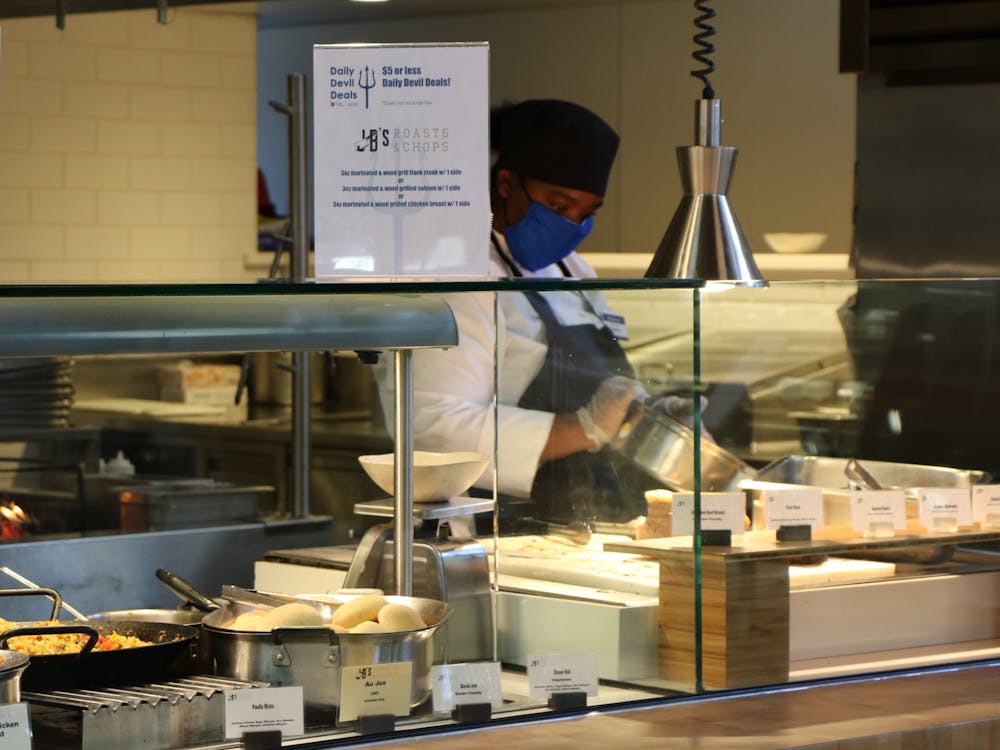Duke has been known to have one of the best dining programs in the country, but some students were disheartened to notice a price increase across venues on campus.
While the increases in meal prices weren’t incredibly high, students have said they have changed their eating habits to adapt to the new costs and not run out of food points. Junior Nicole Izquierdo said that when she arrived on campus at the beginning of the year, she didn’t expect the price of one of the meal options she had purchased in the past to be what it was.
“I was definitely surprised my first week here when I paid for my Sazón bowl,” Izquierdo said. “It was a little bit over $10. I remember it being a lot cheaper, maybe eight or nine dollars.”
Izquierdo’s strategy in prior years, one which she anticipates she will have to continue this year, was to save money at the end of the semester by getting Daily Devil Deals. These are five-dollar meal options available at venues in the Brodhead Center. Izquierdo explained that these options are restrictive in choice and are less in portion size compared to a standard meal.
Junior Josh Klinger has also noticed a substantial increase in the cost of food, particularly at Pitchfork’s.
“For breakfast, I’ve completely boycotted Pitchfork’s,” Klinger said. “Last year, I used to live off Pitchfork’s breakfast. My roommates knew me as the breakfast taco guy. I’m not that anymore.”
Klinger, who is on the largest meal plan, said that he found it harder to budget his food points and get three meals each day without exceeding his suggested daily allotment. For Klinger, this means that pizza, which tends to be a sub-10 dollar meal at Il Forno in the Brodhead Center, has become his go-to meal.
Some students felt that the increases in the prices of meals were excessive, as they are “double taxed” when they buy food on campus. A 7.5% sales tax surcharge is included when students purchase their meal plans, and each individual pays North Carolina sales tax at the point of sale. But the Duke Dining website states that since the tax surcharge is credited to food accounts, “students are not double taxed.”
“I think [the food price increases] are annoying,” junior Ishika Gupta said. “We already pay tax on our food points, and we pay tax when we get the plan. I think increasing prices is inflation to the next level, especially considering that Duke is increasing prices everywhere else in our lives.”
Izquierdo echoed this sentiment.
“Duke’s always trying to make money some way or another,” Izquierdo said. “So, I’m not surprised that [food prices] are going up even though it’s the same quality food and the same amount of food.”
Other students felt that the price increase was unfair because they bought their meal plans for the 2021-22 school year in the spring. Sophomore Randi Jennings explained that parents chose meal plans for their students based on how much they spent last year.
“We chose our plans for this year based on what we spent last year, so if we knew [that prices would be higher] before, we could have made a more informed decision about plans,” Jennings said. “People are feeling sort of cheated by the increase in prices and are upset about it since we’ve already chosen our [meal] plans.”
Executive Director of Dining Robert Coffey explained that there were a variety of factors that led to the increase in prices.
“The local vendors and national brands’ retail prices are market driven. As you are probably aware, unfortunately, the U.S. economy is experiencing unprecedented [Consumer Price Index]/inflation increases. Many factors are causing the price increases related to the pandemic including national labor shortages, major supply chain disruptions, massive energy/fuel increases and more,” Coffey wrote in an email to The Chronicle.
The same students who expressed frustration about the rising prices also sympathized with Coffey’s remarks.
“I do understand having to pay workers and [the University] not doing anything for a year and losing money,” Gupta said. “I do understand why there's been an increase.”
Jennings agreed with Gupta.
“I feel okay about [food prices increasing] because I know that there’s such a big labor shortage in the food industry,” Jennings said. “And it’s also really good quality food for a college dining hall.”
Senior Kevin Tan felt similarly.
Get The Chronicle straight to your inbox
Sign up for our weekly newsletter. Cancel at any time.
“I was disappointed at first,” Tan said. “But at the same time, it kind of makes sense given how COVID made the restaurant industry struggle a lot.”

Adway S. Wadekar is a Trinity junior and former news editor of The Chronicle's 119th volume.

